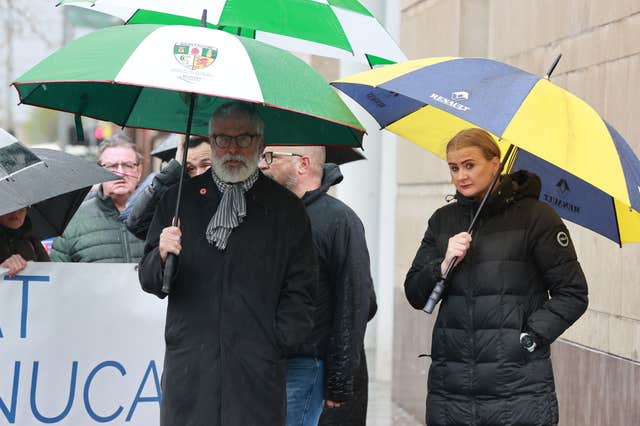Families applaud as Troubles inquest finishes evidence ahead of May cut-off date
Bereaved relatives applauded and hugged one another as a long-running Troubles inquest completed its evidence just hours before a Government guillotine on conflict-related court cases.
Coroner Mr Justice Scoffield thanked all the lawyers involved in the inquest for five people killed in shootings involving the British Army in the Springhill/Westrock areas of west Belfast in 1972, as the final submissions ended shortly after 3pm on the last possible day before the legacy laws come into effect.
Final hearings have been taking place in a series of legacy inquests as part of an intensive court schedule ahead of the deadline. Some inquests have managed to conclude, while others have fallen due to the legislation.

Coroner investigations into Troubles-related deaths must cease on May 1 under the terms of the Government’s Legacy Act.
But cases that are awaiting the delivery of findings, after all the evidence has been heard, can be brought to conclusion after the deadline.
This was the stage reached in the inquests for the Springhill/Westrock killings on Tuesday afternoon, with Mr Justice Scoffield now set to commence consideration of his findings.
The coroner had held a special sitting on Saturday as part of the drive to finish the evidence in time.
Family members rose to their feet and clapped as the coroner formally ended the evidence hearings in Belfast Coroner’s Court after lawyers completed their final submissions on Tuesday.
Three teenagers, a priest and a father-of-six were killed in the shootings.
Those who died were John Dougal, 16, Patrick Butler, 37, Father Noel Fitzpatrick, 42, David McCafferty, 15, and Margaret Gargan, 13.
A fresh inquest was ordered by Northern Ireland’s attorney general in 2014 after an original inquest in 1973 returned an open verdict. It began hearing evidence last February.
Mr Justice Scoffield agreed to fast-track the timetable last September. At the time, he said that while it was realistic to finish ahead of the deadline, he insisted it would be challenging and was not guaranteed.
“I know that all of the lawyers have been working under very considerable pressure in order to properly represent their clients’ interests in our hearings in this inquest and that’s particularly been so in recent weeks,” he said.
“I know many of the lawyers have had to make some sacrifices or compromises in terms of other professional commitments. I suspect only a few of you would have had to attend Saturday court before and I know most, if not all of you will probably now be exhausted and I hope you can have a well-earned rest for a while.
“Unlike me, you don’t have to continue grappling with the evidence to now resolve a range of difficult legal and factual issues and to write up findings.”
The coroner paid tribute to the family members of those who died. He said those who were killed were “valued family members and loved ones who I’m sure are still sorely missed”.
He told the relatives: “You’ve conducted yourselves with dignity and fortitude throughout the proceedings and throughout evidence, which I’m sure was harrowing at times.”
Natasha Butler, whose grandfather was killed, said it was a “hard, long journey” to get to this point.
She said the Legacy Act was a “cruel” piece of legislation which should be scrapped.
Ms Butler said: “It is bittersweet. While we may have had our day in court, our hearts are broken for so many who are being denied their opportunity for truth, justice and accountability.”
The coroner said he needed to manage expectations as to when he would be in a position to deliver his findings. He said it would be at some point this year, but not before September.


